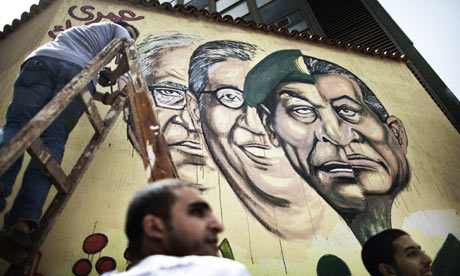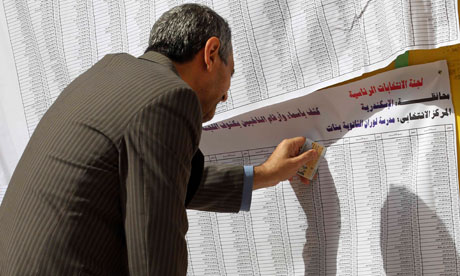
Jasmina Nellestijn
5:12 AM - PublicEgypt presidential election, you can follow the live updates on the link below.
• Turnout expected to be high • Moussa and Abul Fotouh tipped for run off • 50 million eligible to vote in poll overseen by 14,000 judges
10.34am: There is a smattering of support for the leftist Hamdeen Sabahy in eastern Cairo, says Abdel-Rahman Hussein.
One Sabahy voter, Sameh Adly, told him: "This is something different, one never dreamed one could have the freedom to choose their president. Still it could have been better, the candidates aren't the best. Had ElBaradei still been in the race, he would have been a strong contender."
Activist @3arabawy tweets:
My extended family, almost all of them, are voting for Hamdeen.
Journalist Jared Malsin tweets an image of a large Sabahy banner in Mohandessin, Cairo.
On the other side of the tracks (literally) in Mohandessin, Cairo. Lots of Morsi, Foutoh, and Sabahhi banners.pic.twitter.com/e0Th01OZ
10.28am: Presidential candidate Abdel Moneim Abul Fotouh displays an inked finger after voting.
أبوالفتوح عقب الادلاء بصوته فى الانتخابات الرئاسيةpic.twitter.com/Vu0kfp4s
+4
Add a comment...

CAIRO: Over 52 million Egyptians will vote to choose their president in the first-ever competitive elections to be held on Wednesday. The

Egyptians stand in front of a wall with graffiti picturing the morphed faces of ousted president Hosni Mubarak and military ruler Hussein Tantawi and presidential candidates Amr Moussa and Ahmed Shafiq , near Cairo's central Tahrir square. Photograph Marco Longari/AFP/Getty Images
11.08am: Regarding the killing of the policeman (see 11.01am), our reporter Abdel-Rahman Hussein says: "It happened last night, not this morning, and seemed to be a personal squabble according to witnesses I'm talking to here."
11.01am: There are reports that a policeman has been shot and killed at a polling station in the district of Rod El-Farag in central Cairo. The polling station is situated right next to the local police station. The assailants and their motives are still unknown.
10.56am: Al-Jazeera's Adam Makary tweets a step by step account of voting in Suez.
First, you show your national ID card to match your number with those registered to vote. Then, you sign #Suez #EgyElexpic.twitter.com/U2SAagyT
After you tick off the box selecting your preferred candidate, you drop your ballot into a sealed box. #Suez #EgyElexpic.twitter.com/sBt90Tm4
Finally, you collect your ID card, dip your finger in purple, permanent ink and off you go. #Suez #EgyElexpic.twitter.com/UeTHdX7g
10.44am: AP has been gauging opinion among voters in the port city of Alexandria.
"It's a miracle," said Selwa Abdel-Malik, a 60-year-old Christian as she was about to vote. "And it's a beautiful feeling too."
 A man looks for his name before casting his vote at a polling station during presidential elections in Alexandria. Photograph: Mohamed Abd El Ghany/Reuters
A man looks for his name before casting his vote at a polling station during presidential elections in Alexandria. Photograph: Mohamed Abd El Ghany/ReutersReuters has this image from the city.
Photojournalist Matthew Cassel tweets this from Alexandria:
10.43am: How are the mighty fallen ... Farouk Hosny, who spent 24 years as Mubarak's culture minister, joins the queue to vote.
10.21am: Queues appear shorter and more orderly than those in parliamentary elections, Abdel-Rahman Hussein, reports in an audio update from a polling station in eastern Cairo.
"People have learnt their lesson not to mass together early as soon as the polling opens," he says.
He reckons the outcome of the poll is impossible to call.
The race is really wide open. We can't rule out any surprises between maybe four or five candidates ...Candidates will be taking votes off each other. Abul Fotouh will be having his votes taken by Mohamed Morsi, theMuslim Brotherhood candidate. Amr Moussa will have his votes taken by Ahmed Shafiq. That might leave an opening for the dark horse of the race, the nationalist Hamdeen Sabahy.
Abdo himself will not be voting, as he explains:
I understand this is a great moment and is something that many people aspired for and paid for their lives with. But I am personally boycotting because I feel the transition process has been a disaster, and that the military has appropriated the revolution for its own ends ... Whoever wins is not relevant to the military, because their enormous financial interests and secret empire will be maintained irrespective of the winner.
9.48am: Abdel-Rahman Hussein emails this from a polling station in Cairo:
At the Tawfikeya Secondary School in the district of Shubra a long line of men wait patiently to enter the station to cast their vote. There are huge stacks of voting lists tacked on the wall where voters are looking for their name. Voters however are almost dwarfed by the number of security personnel present, a combination of army troops at the door, military police soldiers on the street and regular police officers.
9.46am: The Muslim Brotherhood's candidate Mohammed Morsi will cast his ballot in the wonderfully named Delta town of Zagazig.
9.44am: Predicting disaster is virtually mandatory for Egypt analysts, Marc Lynch says in an article for Foreign Policy. But it may not turn out so bad after all:
If one had fallen asleep in February 2011 and awoken over the weekend to see a country consumed with excitement by [today's] presidential election, things might look different.Egypt now has an elected parliament, which has underperfomed in some ways but does enjoy real electoral legitimacy. The presidential election is hotly contested by mostly non-disastrous leading candidates in which the outcome is very much unknown.Politics, as predicted, has shifted mostly from the streets to the ballot box, and election fever has gripped the country. The military still seems intent on carving out its own empire within the state, but has consistently refused abundant opportunities to postpone the transfer of power to an elected government.Islamists, after sweeping parliamentary elections, seem to be losing some ground with the public in part through their own political mistakes (such as fielding a presidential candidate after promising not to do so and poorly managing the Parliament they won). Former regime fullulwere wiped out in those same elections, and remain on the defensive. Could it be that Egypt's disastrous transition might still end up pretty much okay?
9.34am: Google has chosen to mark the elections with a doodle.
Google celebrates Egyptian Presidential elections with a doodle on the search engine's home page for Egyptpic.twitter.com/6Wrv68Wt
A nod perhaps to Wael Ghonim, the Google executive, who was imprisoned during last year's revolution.
9.27am: Journalist Magdi Abdelhadi sounds a cautionary note about Egypt's presidential election. In an article for Comment is free, he says it's a game of the least bad option:
Egyptians, having staged the first popular revolution in their history, are being asked not to choose the future but to choose between various versions of an imagined glorious past.This is hardly surprising. Nasserism (or pan-Arab nationalism) and Islamism represent the two political discourses that have dominated Egypt – and the so-called Arab world – for the past half a century or so. And, contrary to popular perception, they have more in common than meets the eye.If you take out God, their ideological deep structure is remarkably similar. Both cultivate an inflated sense of collective grandeur, stolen past glory, and whatever went wrong with the nation, it's always someone else's fault: the crusaders, the moguls, the colonial masters, the Americans, Israel, the Shias, the Persians.Alien notions such as individual freedom and human rights have recently made entry into their discourse. This is not so much the result of internal revisions but, thanks to the tireless work of the younger generation and local NGOs (some of which are, incidentally funded by the "infidel") and the ever-so-conspiring west.Such values have yet to translate into powerful grassroots movements or parties that can take on the pan-Arab-nationalist and Islamist dinosaurs. Find me a genuine liberal party in Egypt today and I will find you the proverbial needle in the haystack.
9.20am: Amr Moussa has joined a queue to vote at a polling station in Cairo.
Amr Moussa standing in line to cast his vote in Fatma Anan prep. school polling station, New Cairo. #EgyPresElexpic.twitter.com/ciZUJmMU
9.15am: It looks as though ex-president Mubarak will not be voting, even though he has the right to do so. Unconvicted prisoners have to make a formal request, but it is unclear how they can actually vote if a request is granted, al-Masry al-Youm says, citing interior ministry sources.
The sources added that former President Mubarak, who is detained in a medical centre, and 44 former regime officials, held in five different prisons, have all not applied to vote. The law allows detainees to vote as long as they have not been convicted.The sources said it is impossible for thousands of detainees to vote because voting requires polling stations, civil workers and judges to supervise the elections, particularly as prisoners number over 3,000 in different prisons in Cairo and 1,000 in Tora Prison.The sources said that the law gives detainees against whom no final judgment has been issued the right to vote by submitting a request to the prison administration, who will write a report about his or her legal situation and alert the Presidential Elections Commission.
9.10am: The Guardian's former Cairo correspondent Jack Shenker tweets this vignette showing hostility to a supporter of former prime minister Ahmed Shafiq:
Man on metro starts booming about the greatness of Ahmed Shafiq as we pass through al-Shuhadaa' ('the martyrs') station (formerly 'Mubarak')
Full-ruckus ensues, everyone's shouting and finger-jabbing. Some pro-Sabahi elder women look ready to smack the Shafiq-lover in the face
9.05am: "It feels like a very big day," says Ian Black in an audio update from Cairo.
The preparations are being overseen fairly efficiently by the military. They are taking it [the elections] seriously, most people believe they don't want to hang on directly to power ...But there are big political and constitutional questions that need to be worked out, not least the powers of the new president ...There is a lot of stake, but a great sense of excitement. There's a headline in one newspaper al-Akhbar which says "Your Vote equals the future of Egypt". A dramatic tone is being struck on what looks like being a dramatic and exciting.
Most people believe the poll will be fair, but there are lingering suspicions about electoral fraud.
Ian says that Moussa and Abul Fotouh pass the Cairo taxi driver test as the candidates most likely to make it to a run off in June. But the race is still wide open, he says. And, whoever wins is going to have to get on with the army, which will remain a powerful player whatever its formal constitutional position.
8.30am: Three foreign NGOs have been authorised to monitor the elections, including the Carter Center. Its founder Jimmy Carter was spotted at a polling station by al-Jazeera's Evan Hill.
Jimmy Carter arrives at this girl's school in Sayyida Zeinab.pic.twitter.com/9nqWKqED
8.24am: Abdel-Rahman Hussein clears up some confusion about the number of candidates standing in the elections.
Add a comment...
From the web
For the Egyptians, this is the first opportunity in their 5000 years of recorded history to choose their leader. The Supreme Council of the Armed Forces (SCAF), which assumed presidential powers in February, 2011, has vowed to take care that a fair poll takes place and therefore a tight security ...






















